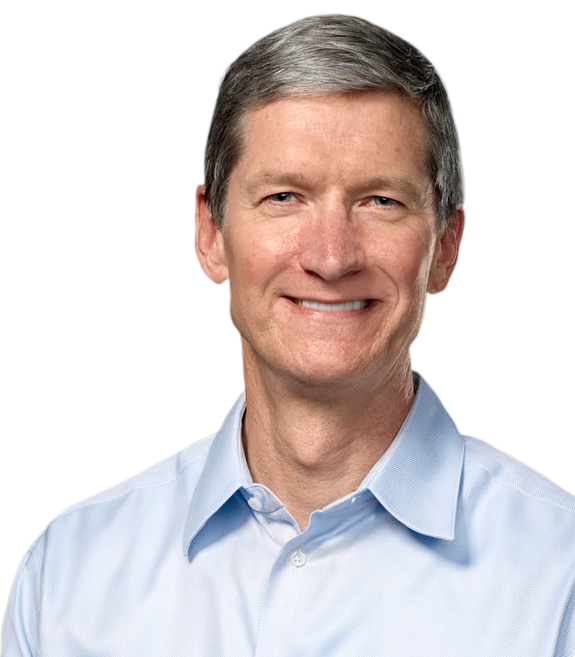In cateva articole: 1, 2, 3, 4, 5 am acoperit cele mai importante subiecte prezentate de catre Tim Cook in cadrul unei conferinte Goldman Sachs ce a avut loc astazi, insa mai jos aveti o transcriere a tuturor raspunruilor pe care CEO-ul Apple le-a avut pentru intrebarile modratorului. Acolo veti gasi destule informatii interesante despre Apple si va recomand sa le cititi pe toate.
Question about Apple’s cash usage strategy…do you have a Depression-era mentality?
What a way to start! We’re making significant investments in a number of areas: supply chain, retail stores, corporate acquisitions, etc. Now, we do have a significant amount of cash, and we’re fortunate to have that. We’re returning some of it to investors and will continue to have discussions on that.
Thoughts on Greenlight’s proposal about unlocking more capital for shareholders?
We welcome input from our shareholders and are discussing a broad array of options.
How about Greenlight’s lawsuit regarding your proxy statement?
There are some misconceptions over what this is about. It’s not about turning money back to shareholders. It’s about corporate governance. So we’ve decided to eliminate the ability to issue “blank check” shares ourselves. We could still do it, but would have to go to shareholders for approval. So frankly, this seems bizarre to me that we’re being sued over something that’s good for shareholders.
We wish people involved in this lawsuit would take this money and donate it to a good cause. This is a waste of money for all involved…a silly sideshow. But you’re not going to see us sending out a mailing or campaigning for our proposal. It’s the right thing to do, and I’m going to vote for it. You’re not going to see a “Yes on 2” sign in my front yard.
Question on acquisitions…most of them are small. Is there something in your culture against large acquisitions?
We do a fair number of acquisitions…one every other month. Most of them are for talented people working on smaller projects that we absorb and then move them to our own projects. PA Semi is an example…talented chip folks working on PowerPC and we moved them to iOS device work. We’ll do more deals like this.
As for large companies, we have and will continue to look at them. But so far they haven’t passed smell test for us. We could do it, but we’re disciplined. Not interested in just growing revenue, but if there was a large acquisition that fit our needs, we would do it.
How do we think about Apple’s culture of innovation today?
It’s never been stronger. It’s so embedded in Apple…the desire to make the very best products in the world. It’s in the DNA of the company, and so I feel fantastic about it. Now, if you look at some essentials for innovation, there’s no formula. But some of the essentials are skills and leadership. If you look at skills, Apple is in a unique and unrivaled position…expertise in software, hardware, and services. Consumers want an elegant experience where technology floats to background and customer is at the center. The real magic happens at the intersection of software, hardware, and services, and we have the ability to innovate and create magic there.
For many year, this idea of “vertical integration” was out of favor. People thought it was kind of crazy, but we never did and we continued to build. This is something you work decades for. I think there are people trying desperately to catch up, and they’re finding it very difficult to do.
In terms of leadership, I look around the executive boardroom and see superstars. Jony Ive is the top designer and now turning his attention to software. Bob Mansfield is the leader in silicon. No one better than Jeff Williams at operations. Schiller, Riccio, etc. I’ve never been more bullish on Apple…we have the talent to pull this off.
Question about law of large numbers. Have we reached a natural limit on iPhone growth?
We don’t have the word “limit” in our vocabulary. It’s because of that that we’ve been able to do things for so many years and deliver things people never knew they needed. When I look at smartphone market, I see a market that was at 700 million last year…projected to double over next four years. Over the long-term all phones will be smartphones and there are a lot more people in the world than 1.4 billion. And people like to upgrade regularly. This is an enormous market to get to.
We’ve sold 500 million as of the end of last year, but over 40% of that happened last year. So there’s incredible momentum. And we’ve built a great ecosystem that is also fueling a developer industry..we’ve now paid out over $8 billion to them. Innovation has all moved to tablets and smartphones, so there’s so much momentum. When you look at what we’re doing in China, it’s impressive. There are also areas where we’re not doing as well, and we view those as opportunities. When I string all of these things together, I see a wide open field.
Question about opportunities…low-cost and prepaid markets have little access to iPhone given expense. How do you create a quality product accessible to more people?
We wouldn’t do anything we don’t consider to be a great product. That’s just not who we are. That said, if you look at what we’ve done for people who are price sensitive, we’ve lowered the price of the iPhone 4 and 4S as of last September, and last quarter we didn’t have enough supply of the iPhone 4. It surprised us.
Also take a look at the history of iPod. When we started, it was $399. Now you can get an iPod shuffle for $49. Rather than cheapening, we build new products with a separate experience. For years, people said ‘Why don’t you have a Mac under $500 or $1000 or whatever?’ We worked on that for a long time and came up with the iPad. So we’re always trying to reinvent with great new products.
Question about Apple’s design choices..focusing on iPhone 5 screen size and how Apple’s knows it’s right for users.
First of all, I’m not going to talk about what we might do in the future. But look back at the PC industry…companies have historically competed on two fronts: price and specs. But customers are interested in the experience. Do you know the speed of an Ax processor? It doesn’t matter. So when we look at displays, there are a lot of factors…and it’s all about the experience. There are many details of a display (Retina is twice as bright as OLED, and better color saturation), and we sweat all of them to create the best experience, which is always broader than can be defined by a single number.
Question about the “Apple would never…” religion
The only thing we’ll never do is make a crappy product. That’s the only religion we have…we must do something great. Something bold, something ambitious. Something great for the customers, and we sweat all of the details.
Question about iPad and potential for tablet market
It’s a huge opportunity. It’s an ideal example of the intersection of hardware, software, and services. Look at PCs…we sold more iPads last year than market leader HP sold of their entire PC lineup. There were about 120 million sold last year…projections suggest 375 million within four years. Will exceed PC sales.
Apple is the poster child of the post-PC revolution. We have over 300,000 apps custom designed for the tablet. The other guys have a few hundred. And you can see the whole of Apple coming out here. I don’t know about market share because we’re the only ones really report numbers, but if you look at usage, IBM saw over Black Friday that shopping activity on iPad was twice as high as the entire Android market. Data is very clear that iPad is popular and people use them more. I’m not sure what people are doing with these other tablets. We want people to use our products, not just buy them. Our relationship starts there…it doesn’t end there.
iPad is also moving into all of the key markets. In almost every Fortune 500/Global 500 company. Making inroads in education, and of course consumers. It usually takes a long time to penetrate all of these markets, but we’ve already done that. But we still think we’re in the early innings of this. Customers want integration and we deliver that.
iPad mini was huge last quarter. iPad set a standard for pricing, and iPad mini brought that down further. But it did bring down margins. What about tradeoffs between entry pricing and financials for the company.
I get asked about cannibalization a lot. The first time I remember being asked about this was the iBook versus the PowerBook. When the iPad came out, people said we were going to kill the Mac. The truth is we don’t think about that. If we don’t cannibalize, someone else will. In the case of iPad, the Windows PC market is huge, and there’s a lot more there to cannibalize than there is of Mac. If a company ever begins to use cannibalization as a major factor in their decision-making, it’s the beginning of the end. Because if they don’t, someone else will.
If you look at the iPad, over 50% of the people buying iPad in countries like China and Brazil don’t own any other Apple products. And we’ve seen a very clear pattern of people buying an initial Apple product and then buying more. We’ve seen this halo effect with iPod for the Mac, iPod for iPhone, and now even iPad for iPhone. Seems perfectly reasonable to me to have both iPad and iPad mini in our lineup. I think this is going to be the mother of all markets. And customers are voting and they’re buying.
Your margins have long been above your competitors’. How do you think about this over the long-term?
I don’t want to get into projecting margins beyond what we do in conference calls, but in general here’s what we do. You can always go in and accept a lower margin for strategic reasons, but at the background we always know that this halo effect plays out. We also are confident in our ability to manage the supply chain and bring down the cost curve. Because we’re not a “hardware company”, we have other ways to make money and reward shareholders. Last quarter, for software and services, it was $3.7 billion. If you look at software and services companies, that’s an incredible amount of revenue. Being more than just a hardware company gives us some flexibility over the short-term. We’re managing Apple for the long-term.
Looking at Apple as a platform company, address how things might differ between developed markets and emerging markets. Some markets, for reasons outside of Apple’s control, don’t have iTunes music and movies, etc. How does that affect platform strategy.
Last year, we put major effort into expanding our ecosystem into new markets…App Store, iTunes Store, iBookstore all in over 100 countries. Only one major country where we’re not selling movies. We advanced significantly last year in getting our infrastructure in place in countries around the world. We still have a ways to go, and you’re right, in some cases it’s beyond our control, but we keep knocking on the door. But versus last year when we were talking, there is a dramatic difference in our ecosystem in emerging markets.
Question on retail strategy
There’s no better place to discover, explore, and learn about our products than our retail stores. Our people are amazing. You walk in and immediately realize the store isn’t there for selling, but for service. The store helps you get more out of your products and acts as a gathering place. You might find a youth program with kids coming on an elementary school field trip. You might find a local musician performing. I’m not even sure “store” is the right word anymore. They are the face of Apple for almost all of our customers. People don’t think about the Cupertino headquarters…they think about the local Apple store. Last quarter, we welcomed 120 million people in our stores, and we only have a little over 400 of them.
So this is huge, in fact so huge that some of our stores aren’t big enough. But like cash, it’s a good problem to have. So this year we’re closing 20 stores and moving them to larger spaces. And opening 30 more stores, disproportionately outside of the U.S., including first store in Turkey.
I don’t think we would have been nearly as successful with iPad if it weren’t for our stores. This was something new that people didn’t know anything about, but the stores gave people the chance to come in and experience it.
We’re incredibly bullish on stores and going to continue to invest in them. Our people are fantastic, and there’s no place quite like it. I don’t have very many bad days, but if I ever feel that I’m dropping down from an excited level, I go and visit a store. It’s like a Prozac.
Look back at first full year as CEO. What are you most proud of?
Most proud of our employees. I have the privilege every day of working with people who want to make the very best products in the world, and they’re there to do not only great work, but the best work of their lives. It’s a privilege of a lifetime for me to be there now.
I’m proud of products. For those things we’ve elected to do, they’re really great. I’m incredibly bullish on the future. I’m proud that we have a spine and are out in front on supply chain responsibility. I’m proud that we’re doing heavy lifting with the environment…eliminated toxics, largest private solar farm anywhere, etc. I’m proud about all of these things. It’s both the privilege of a lifetime and incredibly humbling to be able to work with all of these great people.

















